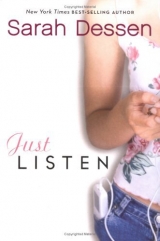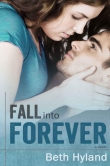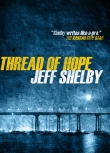
Текст книги "Just Listen"
Автор книги: Sarah Dessen
Соавторы: Sarah Dessen
Жанр:
Подростковая литература
сообщить о нарушении
Текущая страница: 18 (всего у книги 18 страниц)
"The basic fact is that I should have been here. I have no excuse. There is no excuse." He looked down at the ground, scuffing his foot across the pavement. "I mean, there is a reason. But it's not an excuse."
"Owen," I said. "It's—"
"Something happened." He sighed, shaking his head. His face was flushed, and he was still fidgeting. "Something stupid. I made a mistake, and—"
Then, and only then, did I put it altogether. His absence. This shuffling embarrassment. And Will Cash's black eye. Oh my God, I thought.
"Owen," I said, my voice low. "No way."
"It was an error in judgment," he said quickly. "And something I regret."
"Something," I repeated.
"Yes."
A businessman talking loudly on a cell phone passed us, talking about mergers. "Placeholder," I told him.
He winced. "I thought you might say that."
"Come on," I said. "You knew I would say that."
"Fine, fine." He pulled a hand through his hair. "I was having an in-depth discussion with my mother. One that I could not easily extract myself from."
"A discussion," I repeated. "About what?"
Again, he flinched. This was killing him. And yet I could not help myself. After being on the other side of the truth for so long, I realized I kind of liked asking the questions.
"Well," he said, then coughed. "Basically, I'm supposed to be under punishment right now. For the foreseeable future, in fact. So I had to negotiate a furlough. It took longer than I expected."
"You're grounded," I said, clarifying.
"Yes."
"For what?"
He winced, then shook his head, looking over at the fountain. Who knew the truth could be so hard for Owen Armstrong, the most honest boy in the world. But if I asked, he would tell. That I knew for sure.
"Owen," I said as he squirmed, noticeably, his shoulder wriggling, "what did you do?"
He just looked at me for a minute. Then he sighed. "I punched Will Cash in the face."
"What were you thinking?"
"Well, clearly I wasn't." He flushed a deeper red. "I didn't intend to do it."
"You punched him by accident."
"No." He shot me a look. "Okay, you really want to know?"
"Am I not asking?"
"Look," Owen said, "the truth is, after you left yesterday, I was really pissed off. I mean, I'm human, right?"
"You are," I agreed.
"I really only wanted to get a good look at him. That was all. And I knew he sometimes plays with that shitty Perkins
Day band that was in a showcase last night at Bendo, so I figured he might be there. And he was. Which, really, when you think about it, is despicable. What kind of a person goes to a club—to see a shitty band, no less—the night before he's due in court? It's—"
"Owen," I said.
"I'm serious! Do you know how much they suck? Seriously, even for a cover band they're pathetic. I mean, if you're going to just come out and admit you can't write your own songs, at least be able to play other people's well…"
I just looked at him.
"Right," he said. He ran a hand through his hair again. "So anyway, he was there, I got a look at him, end of story."
"Clearly," I said sternly, "that is not the end of the story."
Owen continued, reluctantly. "I watched their set. Which, as I said, sucked. I went out for some air, and he was outside smoking a cigarette. And he starts talking to me. Like we know each other. Like he's not the freaking scum of the earth, a total fucking asshole."
"Owen," I said softly.
"I could feel myself getting more and more pissed off." He winced. "I knew I should breathe, and walk away, and everything else, but I didn't. And then, when he finished his cigarette, he clapped me on the shoulder and turned to go back inside. And I just—"
I took a step closer to him.
"—snapped," he finished. "I lost it."
"It's okay," I said.
"I knew even when I was doing it I'd regret it," he said.
"That it wasn't worth it. But by then it was already happening. I'm really pissed off at myself, if you want to know the truth."
"I know."
"It was just one punch," he grumbled, then added quickly, "which doesn't make it okay. And I'm so freaking lucky the bouncer just broke us up and told us both to get out of there, and didn't call the cops. If he had…" He trailed off. "It's just so stupid."
"But you told your mom anyway," I said.
"When I got home, she could tell I was pissed. So she asked me what happened, and I had to tell her—"
"Because you're honest," I said, taking another step.
"Well, yeah," he said, looking down at me. "She was livid, to say the least. Laid down this hardcore punishment, totally deserved, but then today, when I tried to leave to come here, things got kind of sticky."
"It's okay," I said again.
"It's not, though." Behind him, the fountain was splashing, sunlight glinting off the water. "Because I'm not like that. Anymore. I just… freaked out."
I reached up, brushing his hair out of his face. "Huh," I said. "Really."
"What?"
"I don't know." I shrugged. "It's just to me, that's not freaking out."
"It's not," he said. Then he just looked at me for a second. "Oh," he said finally. "Right."
"I mean, to me," I said, moving closer, "freaking out is different. More of a running away, not telling anyone what's wrong, slowly simmering until you burst kind of thing."
"Ah," he said. "Well, I guess it's just a matter of semantics."
"I guess so."
People were still moving all around us, on their way here and there, filling up their lunch hour however they could before the rest of the day began. I knew that somewhere behind me, my family was waiting, but still I reached my hand down to brush his.
"You know," Owen said, as his fingers found mine, "it sure seems like you have all the answers."
"Nah," I told him. "I'm just doing the best I can, under the circumstances."
"How's that going?" he asked.
There was no short answer to this; like so much else, it was a long story. But what really makes any story real is knowing someone will hear it. And understand.
"Well, you know," I said to Owen now. "It's day by day."
He smiled at me, and I smiled back, then stepped closer, turning my face up to meet his. As he leaned down to kiss me, I closed my eyes and saw not the flat black of the dark but something else. Something brighter, closer to light, shining small but ever steady. More than enough to go on as a part of me pushed up and out, finally, to meet it there.
Chapter Twenty
I slipped on my headphones, then looked over at Rolly. When he flashed me a thumbs-up, I leaned into the microphone.
"It's seven fifty, and you're listening to your community radio station, WRUS. If you're looking for Anger Management, it will return in"—I glanced at my notepad, where, above my neatly written playlist, there was a big number two, followed by an exclamation point—"two weeks. In the meantime, I'm Annabel, and this is Story of My Life. Here's The Clash."
I kept my headphones on, watching Rolly until the first notes of "Rebel Waltz" were audible. Then I finally let out the breath I felt like I'd been holding forever, just as the speaker over my head popped and Clarke came on.
"Nice," she said. "You barely sounded nervous."
"That's still nervous," I told her.
"You're doing great," Rolly said. "And I don't know why you get so worried anyway. It's not like you're walking in front of people in a bathing suit." Clarke turned, shooting him a look. "What?" he said. "It's true!"
"This is harder," I said, sliding off my headphones. "Much harder."
"Why?" he asked.
I shrugged. "I don't know," I said. "It's more real. Personal."
And it was. In fact, I'd been terrified when Owen had first asked me to fill in when his mom decided that taking away the radio show was the only sufficient punishment for what he'd done to Will Cash. But once he'd convinced me that Rolly (and Clarke) would be there to help with the technical stuff and make sure I stayed on time every week, I'd agreed to try it at least once. That had been four weeks ago, and while I was still nervous, I was also having fun. So much that Rolly was already bugging me to take the community radio prep course and apply for my own time slot, but I wasn't quite ready for that yet. But never say never.
Of course, Owen was still involved with the show. When I'd first started subbing for him, he'd insisted that I stick to his playlist, even when it meant forcing music I hated on the masses. After the first week, though (and once he realized that he really couldn't stop me), he'd relented, and I'd started putting my own songs in here and there. There was something really great about being able to put something out into the world—a song, an introduction, even my voice—and let people make of it what they wanted. I didn't have to worry about how I looked, or if the image of me people had fit who I really was. The music spoke for itself and for me, and after so long being watched and studied, I was finding I liked that. A lot.
Rolly knocked on the glass between us, then signaled to me to get the next song ready to go. It was a Jenny Reef single, for Mallory—my first true fan—who made a point of setting her alarm each week so she could call in a request. I cued it up, then waited until The Clash began to fade out before hitting the button to begin its bouncy beats (a segue that I knew would annoy Owen, who for various reasons insisted on listening to the broadcast of the show in the car, alone). Once it had fully started, I shifted in my chair, glancing over at the row of pictures I had lined up next to my monitor. When I'd first started, I'd been so nervous I figured I could use all the inspiration I could get. So I'd brought in the shot of Mallory with the feather boa circling her face, to remind me at least one person was listening. The one of me Owen had taken, so I'd keep in mind that it didn't matter if she was the only one. And then one more.
It was shot of me and my mother and sisters, taken at New Year's. Unlike the one in the foyer, it was hardly professional, with no dramatic vista behind us. Instead, we were all standing at the kitchen island. We'd just been talking, about what I couldn't even remember, and then Kirsten's boyfriend Brian– with the class over, they were now free and clear to make their relationship public—was telling us to look here, and the shutter snapped. It was not a great picture in the technical sense. You can see the flash in the window behind us, my mother has her mouth open, and Whitney is laughing. But I loved it, because it was what we looked like. And best of all, this time no one was in the middle.
Every time I looked at it, I was reminded how much I liked this new life, without a secret hanging over me. It was a fresh start, and now I didn't have to be the girl who had everything, or nothing, but another girl altogether. Maybe even the one who told.
"Two minutes until next break," Rolly said now, and I nod-ded, sliding my headphones back on. As he leaned back from the microphone, Clarke reached over, ruffling his hair. He smiled at her, making a face as she went back to the Sunday crossword, which she made a point of trying to complete every week during the hour the show was on. Clarke was competitive, even with herself. It was one of many things I'd forgotten about her, but was now remembering—like how she always sang along with the radio, refused to watch scary movies, and could make me giggle uncontrollably over the stupidest things—as we cautiously worked our way back into a friendship. It wasn't like it had been, but then neither of us would have wanted that anyway. As it was, we were just happy to be hanging out. Everything else, we took day by day.
This was how I was dealing with everyone and everything lately, taking the good when it came, and the bad the same way, knowing each would pass in its own time. My sisters were still speaking, as well as occasionally still arguing. Kirsten was in her second filmmaking class, working away on a piece about, strangely enough, modeling, which she promised would "rock our world" (whatever that meant). In January, Whitney had enrolled in classes at the local university, where, along with a few requirements, she was taking two writing classes, one on memoir, the other fiction. In the spring, with her doctor's blessing, she was moving into her own apartment, a place she'd made sure had enough light for some plants. In the meantime, her herbs were still in the windowsill, where I made a point to pass them whenever I could, reaching down to smooth their pungent leaves between my fingers, releasing their scent to linger to the open air behind me.
As for my mother, she had accepted all these changes with a few tears—of course—as well as a strength that continually surprised me. I'd told her, finally, that I was done with modeling, for good, and while it was hard for her to let go of that part of my life, and her own, she'd compensated by taking a part-time job with Lindy, who was still desperately in need of a receptionist. It was a good fit. Now she sent other girls out to calls and dealt with clients, keeping one foot in the world where she, out of all of us, always felt the most comfortable.
Still, I knew it would probably be hard for her when the new Kopfs commercial began running in a few weeks. From what I heard, they'd stuck to the same idea as the one I'd done, focusing on the Ideal Girl as she moved through spring sports and prom. It probably would have bothered me, for all the reasons the other one had, if not for the girl they'd picked to replace me: Emily. After all, if anyone could be a role model, it was her.
As far as Emily and I went, we weren't exactly friends. But we both knew what we'd been through would link us forever, whether we liked it or not. Whenever we passed each other in the hallway now, we made a point of saying hello, even if that was all we said. This was more than I could say for Sophie, who studiously ignored both of us. After Will's conviction and sentencing for second-degree rape—six years, although he'd probably be out earlier—she'd laid low for a while, clearly uncomfortable with being the subject of so much discussion. There were times when I saw her alone in the halls, or at lunch, and thought that ideally, I'd be able to go up to her, heal this rift, do for her what she'd never done for me.
Or not.
Thinking this, I looked down at my thumb, slipping off the thick silver ring there to read these same words. It was too big for any of my fingers, and I'd had to wrap some tape on it so it would fit, but it was just fine for now while I was still figuring out what I wanted on the one Rolly had promised me. Until then, Owen had said I could hold on to his, if only to remind me that it's always good to know your options.
"Thirty seconds," Rolly said in my headphones.
I nodded, moving my chair closer to the microphone. As the seconds counted down, I looked out the window to my left and saw a blue Land Cruiser turning into the lot. Right on time.
"And…" Rolly said, "you're on."
"That was Jenny Reef, with 'Whatever,'" I began, "and this has been Story of My Life, here on WRUS. I'm Annabel. The Herbal Prescription is next. Thanks for listening. Here's one last song."
The opening notes of Led Zeppelin's "Thank You" came on, and I pushed back my chair. Then I closed my eyes to listen, as I did every time I heard this song, my own little ritual. Just as the chorus began, I heard the door open and, a moment later, felt a hand on my shoulder.
"Please tell me," Owen said, flopping down dramatically in the chair beside me, "that I did not just hear Jenny Reef on my show."
"It was a request," I said. "And besides, you said I could play what I wanted as long as we called the show something else."
"Within reason," he said. "I mean, you just have to keep in mind that my listeners are going to be confused. They're still tuning in, and they expect quality. If possible, enlightenment. Not commercial, mass-produced crap sung by a teenager completely controlled by corporate marketing."
"Owen."
"I mean, there's room for some irony, but it's a delicate balance. Too much either way and you lose all credibility. Which means that—"
"Are you even listening to what I'm playing now?" I asked.
He stopped in mid-rant, then looked up at the speaker overhead, listening for a second. "Oh," he said. "Well, this is what I mean. This is my—"
"Favorite Led Zeppelin song," I finished for him. "I know."
In the booth, Clarke rolled her eyes.
"Okay, fine," Owen said, moving his chair closer to mine. "So you played some Jenny Reef. I thought the rest of the show was pretty good. Although I'm not sure about the juxtaposition you did in the second pairing—"
"Owen."
"—following up that Alamance track with the Etta James. It was a bit much. And—"
"Owen."
"What?"
I leaned closer to him, pressing my lips to his ear. "Shhh," I said.
He started to say something else—of course—but stopped as I slid my hand over to his, locking his fingers in mine. It wasn't over. Eventually, he'd make his point, or at least argue it into submission. But for now, the chords were building overhead, the chorus starting up again. So I moved closer to Owen, leaning my head on his shoulder to listen, as we settled into the sunlight coming through the window beside us. It was bright and warm, catching the ring on my thumb as Owen reached for it, spinning it slowly, slowly, as the song played on.
Acknowledgments
It takes a Village to see a book from beginning to end, and I am lucky to have good neighbors. Thanks to Leigh Feldman, the most honest person I know, and the fabulous Regina Hayes, who always takes my best and makes it so much better. Joy Peskin gave her perspective and experience when I needed it most. I am also indebted to Marianne Gingher and Bland Simpson at UNC-Chapel Hill, who gave me the second best job I've ever had and, more importantly, continue to understand why writing is the first. I'm grateful to Ann Parrent at WCOM 103.5 Community Radio, and Jeff Welty, dashing vegan criminal defense attorney, for facts and information, and to my parents for yet again talking me down off the ledge. But in the end, this book, like all the others, is really for Jay, who gave me Bob Dylan, Tom Waits, Social Distortion, and a million other songs still playing. Thanks for listening.








